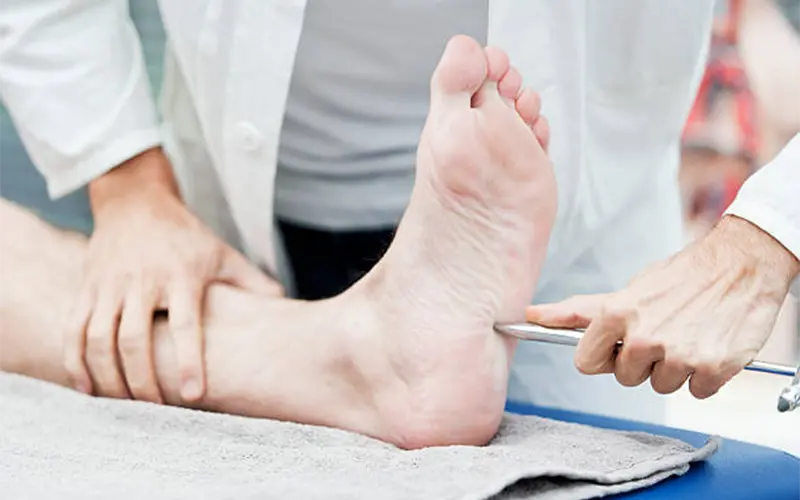Peripheral Neuropathy

If we were to rank all the potential foot and ankle issues a person could develop by level of severity, peripheral neuropathy (nerve damage) is very close to the top. The reason it doesn’t hold down the actual top spot is because an issue that neuropathy sometimes causes—diabetic foot ulcers—would rank above it.
Knowing what peripheral neuropathy is, being able to recognize it, and understanding the measures you need to take if you have nerve issues are all necessary for keeping you safe.
Peripheral Neuropathy Symptoms
Symptoms of peripheral neuropathy can vary from patient to patient. One of the reasons for this is the fact there are three different types of peripheral nerves – motor, autonomic, and sensory.
Your motor nerves are the ones responsible for controlling muscular movement. Depending on the signals your brains sends, muscles will either contract or elongate to achieve the desired action. Autonomic nerves control your involuntary and semi-voluntary functions. An example of an involuntary function is your heart beating—you cannot consciously affect your heartrate. An example for semi-voluntary function is breathing—you can decide to hold your breath, but breathing is normally automatic.
Sensory nerves play a major role in peripheral neuropathy. When the nerves responsible for communicating physical sensations to the brain are damaged, you may experience burning, tingling, and sharp pain. There may be hypersensitivity to touch or the feeling of “pins and needles.” In some cases, you might have a gradual onset of numbness, and this becomes quite concerning.
When motor nerves are damaged, you may also experience muscle weakness or even paralysis.
Peripheral Neuropathy Causes and Risk Factors
Peripheral neuropathy has many different causes, but diabetes is certainly a major one. This disease affects your body in numerous ways, including damaging nerves and impairing their functionality. In this case, the condition develops due to elevated glucose levels in your blood stream. Over half of all individuals afflicted with diabetes will develop neuropathy.
Besides diabetes, other causes of peripheral neuropathy include:
- Alcoholism – Individuals who struggle with alcoholism tend to make poor dietary choices. This leads to vitamin deficiencies (particularly the B and E vitamins, and niacin, that are essential to nerve health).
- Toxins – Exposure to toxic materials like chemicals or heavy metals (such as mercury, arsenic, and lead) can have negative effects for your nervous system.
- Medications – Chemotherapy is an example of the medications that can cause neuropathy.
- Physical trauma – Accidents and fall or sports injuries—especially where there is a lot of physical force—can damage or even severe peripheral nerves.
- Infections – Both viral and bacterial infections can cause problems with your nervous system. Lyme disease, Epstein-Barr virus, shingles, and hepatitis are some examples.
- Other medical issues – Autoimmune disorders (like rheumatoid arthritis, lupus, and necrotizing vasculitis), inherited disorders (Charcot-Marie-Tooth disease), bone marrow disorders, and tumors can all affect your nerve health.
Treatment and Prevention
When it comes to the treatment options our podiatrists use for neuropathy, there are generally two different goals – relieving symptoms and managing the condition responsible for the nerve damage. We customize our treatment plans for patients based on several factors, but neuropathy care may involve:
- Medications – Anti-seizure medications, pain relievers, topical treatments, and antidepressants are all potentially used to treat certain types of nerve pain.
- Therapy – In addition to medication, other nonsurgical options can include therapies and procedures like plasma exchange, intravenous immune globulin, and transcutaneous electrical nerve stimulation (TENS). When neuropathy affects motor nerves and causes muscle weakness, you may be prescribed physical therapy.
- Surgery – Our hope is always to address conditions with conservative care, and peripheral nerve treatment is no exception. There are cases, though, when surgery is needed to resolve your neuropathy issues.
Depending on the case, your doctor may recommend and prescribe custom orthotics. In these cases, the medical devices are not intended to treat the nerve damage. Instead, they can be used as a way to help keep pressure off specific areas on your feet and reduce the risk of foot ulcers (a leading cause of lower limb amputation).
The best form of treatment is always to prevent a medical issue from developing in the first place. Fortunately, there are measures you can take to help keep your nerves strong and healthy. Practices for optimal nerve health include:
- Staying hydrated. Drinking plenty of water (not soda or sugary beverages) is essential for the health of your nerves.
- Eating a balanced diet. Your nerves need the right nutrients—like niacin and vitamins B and E—to stay healthy and strong. Instead of relying on a multivitamin, eat a diet rich in fresh vegetables. Your body is more efficient in absorbing and using nutrients that way.
- Exercising regularly. Regular exercise is instrumental for improving blood circulation and oxygen absorption – both of which contribute to nerve health. Make sure you consult your primary care physician and one of our podiatrists before starting a workout program.
- Managing diabetes (and other medical conditions). As we’ve noted, there is a close association between diabetes and nerve damage. Managing the disease and monitoring your glucose levels help reduce the amount of damage your nerves sustain.
- Quitting smoking (and other tobacco use). There are so many reasons to give up these habits, including the fact that tobacco constricts your blood vessels and deprives your nerves of the nourishment they need to stay healthy.
No matter if diabetes has already caused neuropathy or not, you need to give your feet special care and attention. The Upperline Health medical teams provide a full range of diabetic foot care services to lower your risk of problems. These include annual diabetic foot exams, corn and callus removal, custom orthotics, diabetic toenail care, and more.
If you recognize any of the symptoms of peripheral neuropathy or find anything unusual during your daily foot inspection, contact our team of diabetic foot care professionals at Upperline Health.

Contact one of our Upperline Health clinics to get your Peripheral Neuropathy treatment started.
Treatments offered may vary by clinic.

